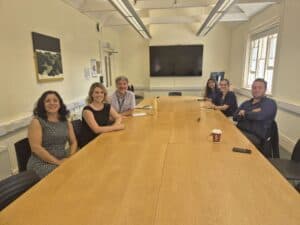Energy efficiency, recycling apps and sustainability ambassadors all part of University’s carbon reduction plan

The University of Chichester has made serious progress on reducing its carbon footprint through various projects in the last year.
Major projects include replacing gas heating with a dehumidifier in the Sports Dome, which has saved £36,000 on energy over the winter – resolving condensation issues while reducing reliance on gas. The cooler climate inside the Dome is also more comfortable for students playing sports.
Works to replace the roof on the Chapel was an opportunity to refurbish the building and install a modern heating system – which is set reduce the University’s energy consumption further. Plus, an old leaking roof on Gym 2 has been replaced with increased thermal insulation to reduce heat loss and energy usage for years to come.
The IT Department replaced the server room’s cooling system, with a forecast saving of £55,000 per year. And works to upgrade the Mitre Lecture Theatre air handling unit, controls and lighting replacements have a forecast energy saving of £13,000 year.
And the introduction of energy monitoring equipment will allow the University to keep check on electricity usage across all buildings, identifying trends and possible savings for the future.
Other projects include an app for students to encourage recycling in Stockbridge Halls, and the Estates team is working with the Psychology Department on a research project to investigate barriers to recycling.
Three current students were hired as sustainability ambassadors to work with the sustainability team to increase community engagement and increase the visibility of its projects. This has included launching an Instagram account @uoc.sustainability.
As well as all the above, the University continues to improve and upgrade its inefficient district heating network as part of a phased programme of works.
Lucy Ferre, Environment and Sustainable Development Officer, said: “The university is working hard to reduce our impact on the planet and send environmentally conscious graduates out into the world.
“We are constantly investing in campus improvements that have sustainability at the heart, and taking opportunities as they present themselves to not only reduce our emissions, but have a positive impact.
“Our focus in the coming year is to continue to educate our community through Carbon Literacy Training and embedding sustainability further into the curriculum, alongside further estate improvements to reduce our energy consumption and generate our own clean energy on site.”
As part of the journey to reduce its carbon footprint, the University is part of the first cohort to be recognised as a Certified Carbon Literate Educator, receiving the bronze award. More than 214 have already received Carbon Literacy Training, 115 staff and 99 students, with more to follow. By educating the University community on this topic, it is hoped that they will lessen the institution’s impact on the planet.
And the University joined the NUS’s Responsible Futures programme, achieving accreditation in September 2024. This programme helps the University to develop a learning experience which equips students with the knowledge and skills to face and address climate and ecological issues. The process included an internal audit of the sustainability content already included in the curriculum and highlighted areas for improvement.
And this week, it was announced that the University has received a Fairtrade University and College Award, one of 12 institutions in the UK to be recognised for ‘sustained commitment over two academic years to increasing awareness and action on trade justice and globalisation’.
Projects that the University has planned for 2025/26 include:
- Installing further electric vehicle (EV) charging points on both campuses.
- Increasing the number of solar panels on roofs to generate more green energy.
- Applying for grant funding, starting with the Heat Network Efficiency Scheme.
- Investing £150,000 to replace end of life rotten timber windows in University House, and a phased window improvement programme will mitigate and reduce significant heat loss throughout older buildings;
- A capital investment of £104,000 to replace existing high energy fluorescent lighting to LED lighting, which includes the astro sports pitch floodlights to reduce its high electricity consumption.
- A £60,000 investment to continue the improvement and replacement of Chichester’s campus district heating network with further phases planned in 2025/26.
The University is also developing a centre for sustainability, with the intention of becoming a trusted hub which can provide support to local businesses in fulfilling their sustainability goals.
MP Jess Brown-Fuller recently visited the university to hear more about the initiative, which aims to bring together research, education and regional enterprise to come up with practical solutions for a more sustainable future.
Professor Antonina Pereira, Director of the Institute of Psychology, Business and Human Sciences, said: “Jess’s visit was an opportunity not only to showcase our strategic ambitions, but to engage in meaningful dialogue about the role of universities in regional transformation. We are proud to be embedded in our community and committed to preparing graduates who are not only employment-ready, but planet-conscious, critically engaged, and ethically driven.”
To find out more about the University of Chichester’s work in this area, follow @uoc.sustainability on Instagram.






